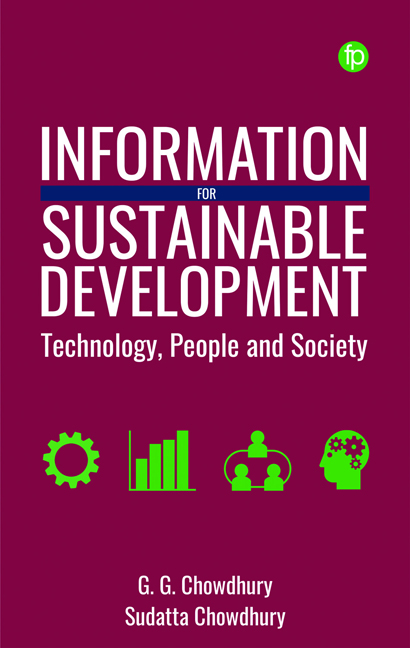Book contents
- Frontmatter
- Dedication
- Contents
- Figures
- Tables
- About the Authors
- Introduction
- 1 Data, Information, People and Society
- 2 Information and the Sustainable Development Goals
- 3 Sustainable Development Goals: Targets and Indicators
- 4 Data, Information and Progress in SDGs
- 5 Capacity, Co-operation and Sharing of Data for SDGs
- 6 People and the SDGs: the Digital Divide
- 7 People and the SDGs: Access to Data and Digital Skills
- 8 Information Skills and the SDGs in Everyday Life
- 9 Information, Education and Sustainable Development
- 10 Research and Development Around the SDGs
- 11 Information Education, Research and Professional Developments Around SDGs
- References
- Index
1 - Data, Information, People and Society
Published online by Cambridge University Press: 13 April 2024
- Frontmatter
- Dedication
- Contents
- Figures
- Tables
- About the Authors
- Introduction
- 1 Data, Information, People and Society
- 2 Information and the Sustainable Development Goals
- 3 Sustainable Development Goals: Targets and Indicators
- 4 Data, Information and Progress in SDGs
- 5 Capacity, Co-operation and Sharing of Data for SDGs
- 6 People and the SDGs: the Digital Divide
- 7 People and the SDGs: Access to Data and Digital Skills
- 8 Information Skills and the SDGs in Everyday Life
- 9 Information, Education and Sustainable Development
- 10 Research and Development Around the SDGs
- 11 Information Education, Research and Professional Developments Around SDGs
- References
- Index
Summary
Introduction
In its meeting on 25 September 2015, the United Nations General Assembly adopted the Resolution A/RES/70/1 that proposed 17 Sustainable Development Goals (SDGs) and the associated Targets (UN General Assembly, 2015a) (see Figure 1.1). Although they were adopted as a UN Resolution in 2015, SDGs are successors of the UN Millennium Development Goals (MDGs) adopted in 2000 (United Nations, 2013a). The SDGs are ‘universal goals and targets which involve the entire world, developed and developing countries alike’ (UN General Assembly, 2015a, 3). Alongside the continuing development priorities, such as poverty eradication, health and wellbeing, education for all and food security and nutrition, SDGs set out a wide range of economic, social and environmental objectives; promise more peaceful and inclusive societies; and define means of implementation of the Goals and Targets (UN General Assembly, 2015a).
More details of the 17 SDGs and the associated Targets are discussed in Chapter 3. Although countries around the world agreed to accept them, right from the beginning there was a debate on how the SDGs and their success could be measured. While the thematic areas covered by the SDGs are well connected with one another, and overall the SDGs as a whole are a more integrated system than the MDGs were (Le Blanc, 2015), the information systems, tools, standards and policies required to measure the achievements in each SDG needed to be developed and adopted by countries around the world.
The importance of, and need for, appropriate management, access, use and sharing of data and information for achieving sustainability in different sectors have been mentioned in several places within the UN, and also other international, policy documents (see for example, UN General Assembly, 2012; OECD, 2010) and information science literature (see for example, Nolin, 2010; Nathan, 2012; Chowdhury, 2013; 2014b; Chowdhury and Koya, 2017).
Several international and national policy documents have recognised the importance of management, access, use and sharing of data and information for sustainable development. For example, the canonical text on sustainable development, Our Common Future (United Nations, 1987), has clearly highlighted the need for improved access to information in a number of places.
- Type
- Chapter
- Information
- Information for Sustainable DevelopmentTechnology, People and Society, pp. 1 - 20Publisher: FacetPrint publication year: 2024



